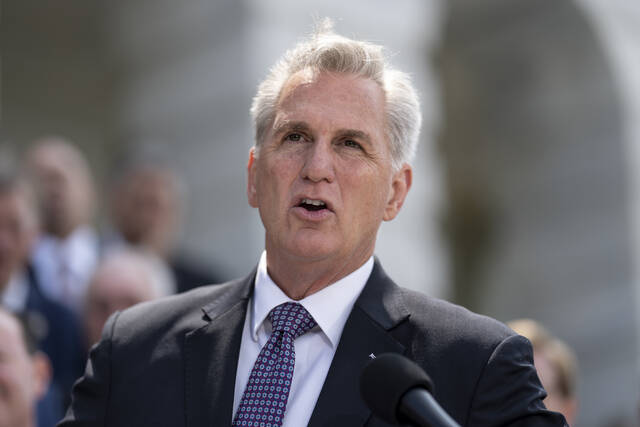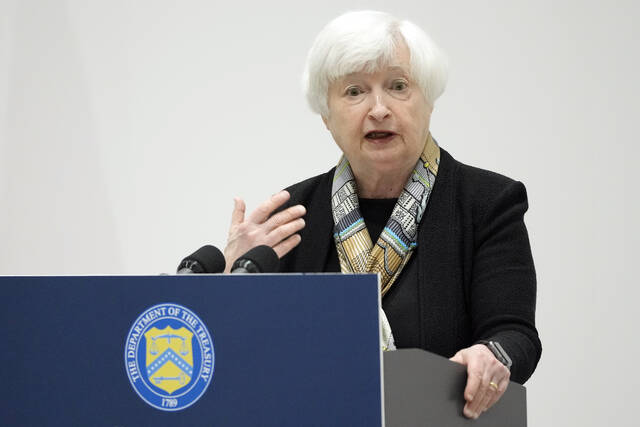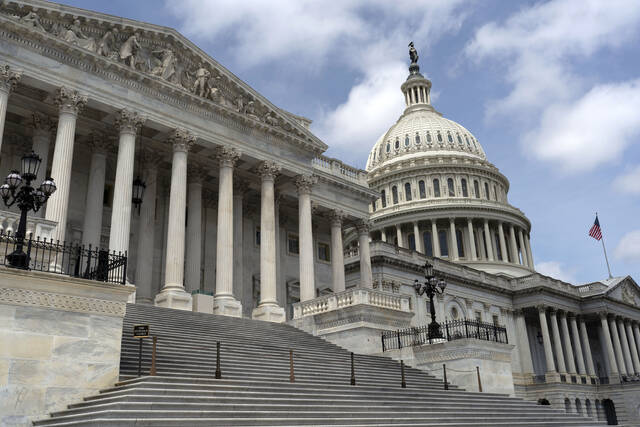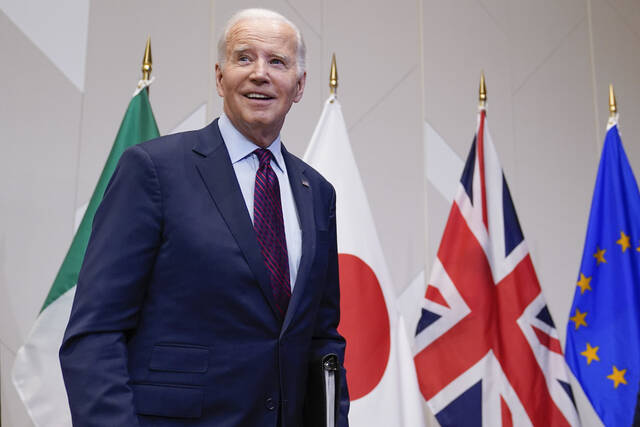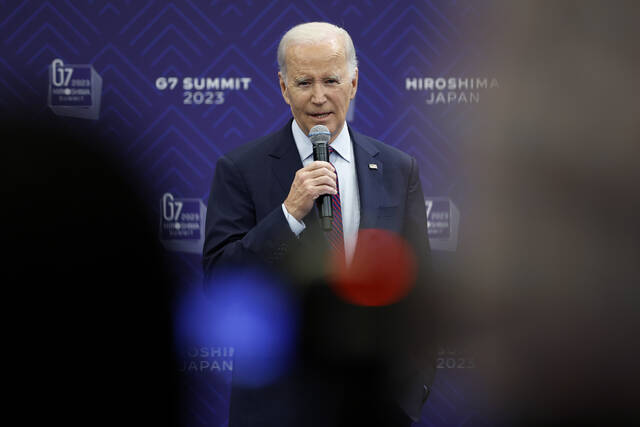Debt ceiling talks to resume as Biden, McCarthy prepare to meet Monday to resolve standoff
WASHINGTON — Debt ceiling talks were set to resume Sunday evening as Washington races to strike a budget compromise along with a deal to raise the nation’s borrowing limit and avert an economy-wrecking federal default.
President Joe Biden and House Speaker Kevin McCarthy spoke by phone Sunday while the president was returning home on Air Force One after the Group of Seven summit in Japan. Upbeat, McCarthy, R-Calif., told reporters at the Capitol that the call was “productive” and that the on-again, off-again negotiations between his staff and White House representatives are focused on spending cuts.
He’s to meet Biden on Monday at the White House.
Negotiators for the Democratic president and Republican speaker appear to be narrowing on a budget cap for the 2024 budget year that would be key to resolving the standoff. They face a deadline, as soon as June 1, when the government could run out of cash to pay its bills. Treasury Secretary Janet Yellen said Sunday that June 1 is a “hard deadline.”
McCarthy said after his call with Biden that “I think we can solve some of these problems if he understands what we’re looking at.” The speaker added, “But I’ve been very clear to him from the very beginning. We have to spend less money than we spent last year.”
McCarthy emerged from that conversation sounding optimistic and was careful not to criticize Biden’s trip, as he had before. He did caution, “There’s no agreement on anything.”
“We’re looking at, how do we have a victory for this country?” McCarthy said. “How do we solve problems? He said he did not think the final legislation would remake the federal budget and the country’s debt, but at least “put us on a path to change the behavior of this runaway spending.”
The White House confirmed the Monday meeting and late Sunday talks but did not elaborate on the leaders’ call.
Earlier, Biden used his concluding news conference in Hiroshima, Japan, to warn House Republicans that they must move off their “extreme positions” over raising the debt limit and that there would be no agreement to avoid a catastrophic default only on their terms.
Biden said “it’s time for Republicans to accept that there is no deal to be made solely, solely, on their partisan terms.” He said he had done his part in attempting to raise the borrowing limit so the government can keep paying its bills, by agreeing to significant cuts in spending. “Now it’s time for the other side to move from their extreme position.”
President Joe Biden and Republican House Speaker Kevin McCarthy will meet to discuss the debt limit on Monday after a ‘productive’ phone call as the president headed back to Washington from the G7 summit https://t.co/GJEftF9grZ pic.twitter.com/B0oVwpqc0Y
— Reuters (@Reuters) May 21, 2023
Biden had been scheduled to travel from Hiroshima to Papua New Guinea and Australia, but cut short his trip in light of the strained negotiations with Capitol Hill.
Even with a new wave of tax revenue expected soon, perhaps giving both sides more time to negotiate, Yellen said on NBC’s “Meet the Press” that “the odds of reaching June 15, while being able to pay all of our bills, is quite low.”
Janet Yellen on Meet the Press: "Something that greatly concerns me is that [Republicans] have even been in favor of removing funding that's been provided to the IRS to crack down on tax fraud ... it amounts to an estimated $7 trillion over the next decade." pic.twitter.com/bpH0Ex0cvr
— Aaron Rupar (@atrupar) May 21, 2023
GOP lawmakers are holding tight to demands for sharp spending cuts with caps on future spending, rejecting the alternatives proposed by the White House for reducing deficits in part with revenue from taxes.
Republicans want to roll back next year’s spending to 2022 levels, but the White House has proposed keeping 2024 the same as it is now, in the 2023 budget year.
A compromise on those topline spending levels would enable McCarthy to deliver for conservatives, while not being so severe that it would chase off the Democratic votes that would be needed in the divided Congress to pass any bill.
Top Republican negotiator Rep. Garret Graves of Louisiana, speaking alongside McCarthy at the Capitol, said the numbers “are the foundation” of any agreement.
Republicans also want work requirements on the Medicaid health care program, though the Biden administration has countered that millions of people could lose coverage. The GOP additionally introduced new cuts to food aid by restricting states’ ability to waive work requirements in places with high joblessness. That idea, when floated under President Donald Trump, was estimated to cause 700,000 people to lose their food benefits.
GOP lawmakers are also seeking cuts in IRS money and, by sparing Defense and Veterans accounts from reductions, would shift the bulk of spending reductions to other federal programs.
The White House has countered by keeping defense and nondefense spending flat next year, which would save $90 billion in the 2024 budget year and $1 trillion over 10 years.
All sides have been eyeing the potential for the package to include a framework that would speed energy project developments.
And despite a push by Republicans for the White House to accept parts of their proposed immigration overhaul, McCarthy indicated the focus was on the House’s previously approved debt and budget package.
“I think that we can reach an agreement,” Biden said, though he added this about Republicans: “I can’t guarantee that they wouldn’t force a default by doing something outrageous.”
Republicans had also rejected various White House revenue proposals. Among the proposals the GOP objects to are policies that would enable Medicare to pay less for prescription drugs. Republicans also have refused to roll back Trump-era tax breaks on corporations and wealthy households as Biden’s own budget has proposed.
Biden, nonetheless, insisted that “revenue is not off the table.”
For months, Biden had refused to engage in talks over the debt limit, contending that Republicans in Congress were trying to use the borrowing limit vote as leverage to extract administration concessions on other policy priorities.
But with the June 1 potential deadline looming and Republicans putting their own legislation on the table, the White House launched talks on a budget deal that could accompany an increase in the debt limit.
Biden’s decision to set up a call with McCarthy came after another start-stop day with no outward signs of progress.
The president tried to assure leaders attending the meeting of the world’s most powerful democracies that the United States would not default. U.S. officials said leaders were concerned, but largely confident that Biden and American lawmakers would resolve the crisis.
Appearing on @ThisWeekABC, House Budget Committee chair Rep. Jodey Arrington pushed back on Pres. Biden's call for tax increases as part of a deal to raise the nation's debt limit to avoid a default. https://t.co/YQMwtNOU33 pic.twitter.com/1QjYge2Anp
— ABC News (@ABC) May 21, 2023
The president, though, said he was ruling out the possibility of taking action on his own to avoid a default. Any such steps, including suggestions to invoke the 14th Amendment as a solution, would become tied up in the courts.
“That’s a question that I think is unresolved,” Biden said, adding he hopes to try to get the judiciary to weigh in on the notion for the future.
Remove the ads from your TribLIVE reading experience but still support the journalists who create the content with TribLIVE Ad-Free.


